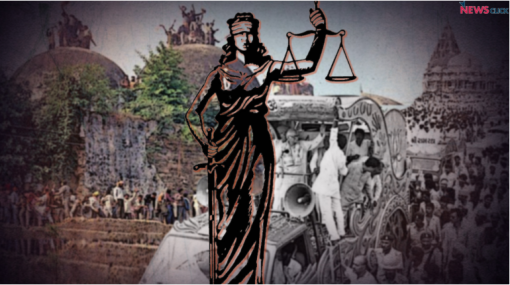
In the light of upcoming Ayodhya verdict from the Supreme Court of India, more than 150 people including students, members of transgender community, domestic workers’ union, teachers, lawyers, farmers and others gathered on November 7, 2019, at Town hall in Bengaluru, to pledge to fight for peace and justice. Professor Babu Mathew of National Law School of India University (NLSIU), Mohan Raj of Dalit Sangharsha Samiti, Mamtha of Women Rights Movement, Chennakrishnappa of Karnataka Samata Sinika Dal, Amjad Pasha of Karnataka Komu Souharda Vedike and others addressed this gathering.
Several of these rights-based groups and organisations have come together under one forum called, Shanthi Mattu Nyayakkagi Naavu (People for Peace and Justice). The forum also organised candle light vigils across the state on the previous evening and has appealed to the people to
-
Not take the law into your hands, whatever may be the verdict
-
Not get provoked by WhatsApp forwards
-
Please verify if news is real or fake before forwarding or getting provoked
-
Report anyone threatening to violate the verdict or indulge in violence to the authorities
-
Remember, India is a land known for unity in diversity, let us protect it
The forum also appealed to the government of Karnataka to maintain law and order. It should be noted that the current government in the state is led by the Bharatiya Janata Party, the same right wing party which has been attributed to have made the Ram Janmabhoomi an electoral issue for the first time. Given the involvement of the saffron party with the Ram Janmabhoomi issue and the stakes that the hardline Hindutva organisations like that of Vishwa Hindu Parishad (VHP), Bajrang Dal and Sri Rama Sene—all very active in the state—have in the issue, the forum asked the government to,
-
Issue an order to the police to: Conduct peace committee meeting at district, taluk and police station limits; take swift action against any group or individuals who threaten violence or threaten to disobey the verdict or make provocative speeches or those who spread fake news
-
Issue an advisory to media houses to avoid provocation and fake news
-
Issue a public statement asking for peace to be maintained and warning that strict action will be taken against those who incite violence or spread fake news
-
Call for an all party meeting with the agenda of discussing maintenance of communal harmony
The forum in its note said, “Any form of violence after the verdict will hurt the poor and marginalised the most. It will destabilise the country and damage the economy. We cannot undergo a repeat of what happened in 1992-93 again. Therefore, we all have the responsibility to maintain peace and rein in passions. The forum appeals to all to fight fake news, maintain harmony and strive for peace.”
Communal Riots Post Babri Demolition in Karnataka
In the aftermath of the demolition of Babri Masjid by karsevaks belonging to the VHP on December 6, 1992, the entire secular fabric of the country had been disturbed as communal tensions and riots broke out. Just before the demolition, Lal Krishna Advani of BJP had carried out a massive Rath Yatra in 1990, starting from Somnath to Ayodhya. The yatra aimed at “educating” the people about the Ram mandir issue is said to have set the stage across the country for the worse to come.
As Tomas Blom Hansen, professor of Anthropology wrote in The Wire, “The RSS and VHP’s willingness to defy the state, the law and the secular consensus, opened for a more confrontational and muscular style of political life. As the riots rocked the country, it was as if an older layer of restrained speech was stripped away. Now, hateful statements, deep stereotypes and endorsement of the killing of Muslims was uttered freely by the respectable family doctor, the bank clerk, the rickshaw wallah and at middle-class dinner parties. Anti-Muslim and openly casteist jokes and remarks could now be made quite freely also among perfect strangers.” Communal hatred and intolerance became the new normal.
Karnataka, too, was rocked by the post Babri riots, which left permanent scars on the secular fabric of the state. Reportedly, 60 were killed in riots in the state following the Babri demolition.
Even before the demolition, there were reports of communal clashes in Shimoga, Arsikere Dharwad and Hubli. Following the procession taken out by the VHP in these places on November 10, 1989, to mark the laying of the foundation stone in Ayodhya, riots broke out because crackers were burst, when large numbers of Muslims had gathered for prayers. This had led to clashes.




